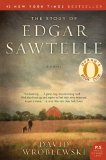Summary | Excerpt | Reading Guide | Reviews | Beyond the Book | Readalikes | Genres & Themes | Author Bio

A Novel
by David Wroblewski
On the living room wall hung a picture of his parents taken the day
a judge in Ashland married them, Gar in a gray suit, Trudy in a knee-
length
white dress. They held a bouquet of flowers between them and
bore expressions so solemn Edgar almost couldn’t recognize them. His
father asked Doctor Papineau, the veterinarian, to watch the dogs while
he and Trudy honeymooned in Door County. Edgar had seen snapshots
taken with his father’s Brownie camera: the two of them sitting on a pier,
Lake Michigan in the background. That was it, all the evidence: a mar-
riage license in the ammo box, a few pictures with wavy edges.
When they returned, Trudy began to share in the work of the kennel.
Gar concentrated on the breeding and whelping and placing while Trudy
took charge of the training - something that, no matter how they’d met,
she shined at. Edgar’s father freely admitted his limitations as a trainer.
He was too kindhearted, too willing to let the dogs get close to per-
forming a command without getting it right. The dogs he trained never
learned the difference between a sit and a down and a stay - they’d get
the idea that they ought to remain approximately where they were, but
sometimes they’d slide to the floor, or take a few steps and then sit, or sit
up when they should have stayed down, or sit down when they should
have stood still. Always, Edgar’s father was more interested in what the
dogs chose to do, a predilection he’d acquired from his own father.
Trudy changed all that. As a trainer, she was relentless and precise,
moving with the same crisp economy Edgar had noticed in teachers and
nurses. And she had singular reflexes - she could correct a dog on lead so
fast you’d burst out laughing to see it. Her hands would fly up and drop
to her waist again in a flash, and the dog’s collar would tighten with a
quiet chink and fall slack again, just that fast, like watching a sleight-
of-hand trick. The dog was left with a surprised look and no idea who’d
hit the lead. In the winter they used the front of the cavernous hay mow
for training, straw bales arranged as barriers, working the dogs in an
enclosed world bounded by the loose scatter of straw underfoot and the
roughhewn ridge beam above, the knotty roof planks a dark dome shot
through with shingling nails and pinpoints of daylight and the crisscross
of rafters hovering in the middle heights and the whole back half of the
mow stacked ten, eleven, twelve high with yellow bales of straw. The
open space was still enormous. Working there with the dogs, Trudy was
at her most charismatic and imperious. Edgar had seen her cross the mow
at a dead run, grab the collar of a dog who refused to down, and bring it
to the floor, all in a single balletic arc. Even the dog had been impressed:
it capered and spun and licked her face as though she had performed a
miracle on its behalf.
Even if Edgar’s parents remained playfully evasive on the subject of
how they’d met, other questions they answered directly. Sometimes they
lapsed into stories about Edgar himself, his birth, how they’d worried
over his voice, how he and Almondine had played together from before
he was out of his crib. Because he worked beside them every day in the
kennel - grooming, naming, and handling the dogs while they waited
turns for training - he had plenty of chances to sign questions and wait
and listen. In quieter moments they even talked about the sad things
that had happened. Saddest of all was the story of that cross under the
birches in the south field.
They wanted a baby. This was the fall of 1954 and they’d been mar-
ried three years. They converted one of the upstairs bedrooms into a nurs-
ery and bought a rocking chair and a crib with a mobile and a dresser, all
painted white, and they moved their own bedroom upstairs to the room
across the hall. That spring Trudy got pregnant. After three months she
miscarried. When winter came she was pregnant again, and again she
miscarried at three months. They went to a doctor in Marshfield who
asked what they ate, what medicines they took, how much they smoked
and drank. The doctor tested his mother’s blood and declared her per-
fectly healthy. Some women are prone, the doctor said. Hold off a year.
He told her not to exert herself.
Excerpted from The Story of Edgar Sawtelle by David Wroblewski Copyright © 2008 by David Wroblewski. Excerpted by permission of Ecco, a division of Random House, Inc. All rights reserved. No part of this excerpt may be reproduced or reprinted without permission in writing from the publisher.
Your guide toexceptional books
BookBrowse seeks out and recommends the best in contemporary fiction and nonfiction—books that not only engage and entertain but also deepen our understanding of ourselves and the world around us.